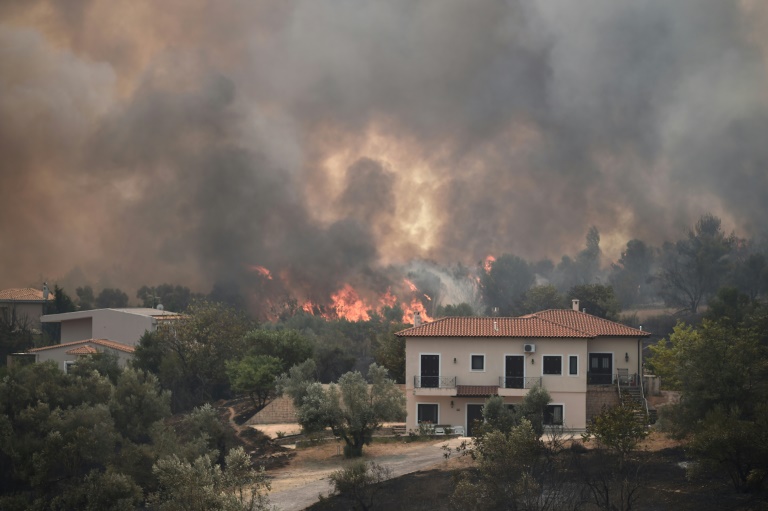Greece’s raging fires claimed their first victim on Friday after a punishing week-long heatwave, while neighbouring Turkey came under rising pressure over its handling of its own devastating wildfires.
Greece and Turkey have been fighting blaze upon blaze over the past week, hit by the region’s worst heatwave in decades, a disaster that officials and experts have linked to increasingly frequent and intense weather events caused by climate change.
A UN draft report seen by AFP has warned that the Mediterranean region, which it called a “climate change hotspot,” will be hit by fiercer heatwaves, droughts and fires supercharged by rising temperatures.
On Friday, a 38-year-old man from Ippokrateio, a town north of Athens hit by giant flames, died in hospital after being hit by a falling electric pole as he was riding a moped, the health ministry said, the first victim of the fires in Greece.
In Turkey, some eight people have been killed and dozens more hospitalised.
– ‘Powder keg’ –
“Our country is facing an extremely critical situation,” Greek Prime Minister Kyriakos Mitsotakis said late Thursday, putting six out of 13 regions in the country under high alert.
“We’re facing unprecedented conditions after several days of heatwave have turned the country into a powder keg.”
North of Athens, a fierce blaze ate through vast areas of pine forest, forcing yet more evacuations of villages overnight and blowing thick, choking smoke all over the Greek capital.
In the small town of Afidnes, 30 kilometres north of the capital (12 miles), firefighters were seen standing on their truck in the dead of night, dousing flames that leapt high above them.
In the morning, the fires had made way for desolation — burnt cars, trees, and houses destroyed.
In nearby Krioneri, the fire scorched homes, businesses and factories.
“The fire in uncontrollable,” said resident Vassiliki Papapanagiotis. “I don’t want to leave, my whole life is here.”
Part of a motorway linking Athens to the north of the country has been shut down as a precaution.
– Foreign help –
Deputy Civil Protection Minister Nikos Hardalias said that out of 99 fires reported on Thursday, 56 were still active.
At least 450 Greek firefighters were fighting the blaze.
Around 82 French firefighters — both military and civilian — arrived on Thursday evening, a French official said.
France was also due to send two water-bombing planes, as was Sweden, while Romania was to dispatch 112 firefighters and 23 vehicles and Switzerland three helicopters, a spokesman for the Greek firefighters told AFP.
Israel, too, is planning to send back-up.
In neighbouring Turkey, President Recep Tayyip Erdogan has come under withering criticism for being slow or unwilling to accept some offers of foreign assistance after revealing that Turkey had no functioning firefighting planes.
According to the presidency, 208 fires have flared up since July 28, and 12 were still ablaze on Friday.
More evacuations took place on Friday in five Turkish provinces, including tourist hotspots Antalya and Mugla, according to NTV.
– ‘Treachery’ –
The Turkish government is also facing pressure after the opposition referred to a report which showed only a fraction of the budget for forest fire prevention had been spent.
The General Directorate of Forestry (OGM) spent only 1.75 percent of nearly 200 million Turkish lira ($23 million) allocated for forest fires in the first six months of 2021, main opposition party MP Murat Emir said, referring to numbers apparently from the state agency’s own report, which he submitted in a parliamentary question.
“This is a situation that one could go as far as to describe as treachery,” he told AFP.
Events like these will become even worse, the UN’s Intergovernmental Panel on Climate Change warned in a draft report due out next year seen by AFP.
The draft predicts that temperatures across the Mediterranean are likely to rise faster than the global average in the decades to come.
“Every heatwave occurring today is made more likely and more intense by human-caused climate change,” Friederike Otto, associate director at the University of Oxford’s Environmental Change Institute, told AFP.
Extreme heat is the most pressing threat facing the Mediterranean region as heatwaves “are by far the deadliest extreme events in Europe,” he said.
“Climate change is forcing Mediterranean landscapes into a flammable state more regularly by drying out vegetation and priming it to burn,” said Matthew Jones, research fellow at the University of East Anglia’s Tyndall Centre for Climate Change Research.
burs/mbx/dl









